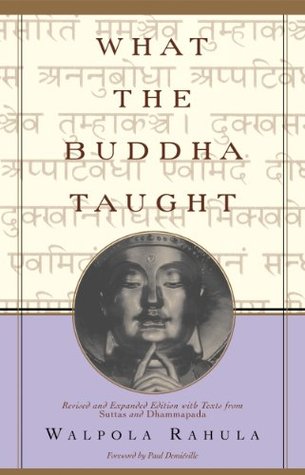More on this book
Community
Kindle Notes & Highlights
Read between
September 24 - October 7, 2025
The Buddha was not only a human being; he claimed no inspiration from any god or external power either. He attributed all his realization, attainments and achievements to human endeavour and human intelligence.
The freedom of thought allowed by the Buddha is unheard of elsewhere in the history of religions. This freedom is necessary because, according to the Buddha, man’s emancipation depends on his own realization of Truth, and not on the benevolent grace of a god or any external power as a reward for his obedient good behaviour.
In fact there is no ‘sin’ in Buddhism, as sin is understood in some religions. The root of all evil is ignorance (avijjā) and false views (micchādiṭṭhi).
Here the term ‘thirst’ includes not only desire for, and attachment to, sense-pleasures, wealth and power, but also desire for, and attachment to, ideas and ideals, views, opinions, theories, conceptions and beliefs (dhamma-taṇhā).2 According to the Buddha’s analysis, all the troubles and strife in the world, from little personal quarrels in families to great wars between nations and countries, arise out of this selfish ‘thirst’.3
According to the teaching of the Buddha, the idea of self is an imaginary, false belief which has no corresponding reality, and it produces harmful thoughts of ‘me’ and ‘mine’, selfish desire, craving, attachment, hatred, ill-will, conceit, pride, egoism, and other defilements, impurities and problems.
Two ideas are psychologically deep-rooted in man: self-protection and self-preservation. For self-protection man has created God, on whom he depends for his own protection, safety and security, just as a child depends on its parent. For self-preservation man has conceived the idea of an immortal Soul or Ātman, which will live eternally. In his ignorance, weakness, fear, and desire, man needs these two things to console himself. Hence he clings to them deeply and fanatically.
Real life is the present moment—not the memories of the past which is dead and gone, nor the dreams of the future which is not yet born. One who lives in the present moment lives the real life, and he is happiest.
The Cakkavattisīhanāda-sutta of the Dīgba-nikāya (No. 26) clearly states that poverty (dāḷiddiya) is the cause of immorality and crimes such as theft, falsehood, violence, hatred, cruelty, etc.
To talk of maintaining peace through the balance of power, or through the threat of nuclear deterrents, is foolish. The might of armaments can only produce fear, and not peace. It is impossible that there can be genuine and lasting peace through fear. Through fear can come only hatred, ill-will and hostility, suppressed perhaps for the time being only, but ready to erupt and become violent at any moment.
If a man’s mind is sorrowless, stainless, and secure, and does not shake when touched by worldly vicissitudes—this is the Highest Blessing.
As a beautiful flower that is full of hue but lacks fragrance, even so fruitless is the well-spoken word of one who does not practise it.
Transient are conditioned things. Try to accomplish your aim with diligence.’


